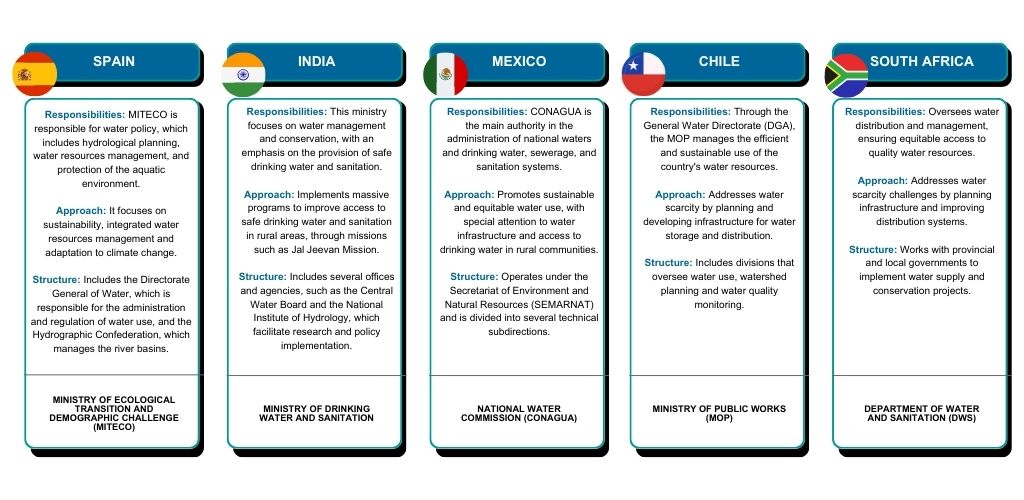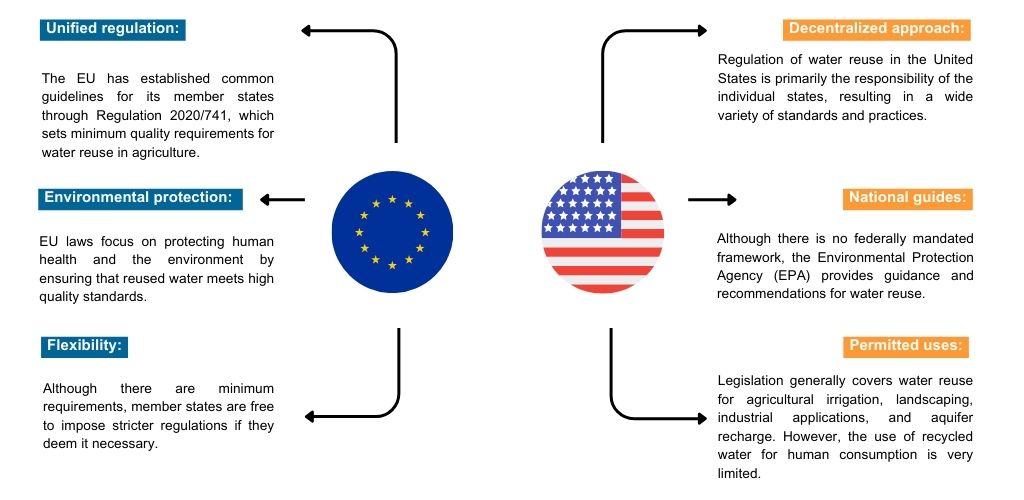
Water Governance: Key Legislation to Tackle Scarcity
Water management is one of the most critical and complex challenges humanity faces in the 21st century. As the global population grows and climate change alters precipitation patterns, the availability of clean, drinkable water is becoming an increasingly scarce resource. Hence, it is important not to underestimate the significance of adequate water legislation.
Through well-designed and efficiently implemented regulatory frameworks, we can protect our water resources, ensure their equitable and sustainable use, and guarantee that all human beings have access to drinking water and sanitation. In this regard, to face the challenges of the present and future, water management must be a priority on political agendas at the local, national, and global levels.
Water Ministries: Who Has the Best Formula for the Water Crisis?
Currently, there is a wide diversity of approaches to water management and a broad structural variety in each state to tackle water-related problems.
It is important to understand how each country addresses the challenges related to this resource, whether it be supply, quality, sanitation, or sustainable management, through the responsible bodies:
 We can observe that sustainability approaches vary; for example, Spain and Mexico have a strong focus on sustainability and integrated management, while India and South Africa focus more on access and sanitation. In Europe, countries tend to integrate climate change adaptation into their policies, while other countries prioritize solving immediate problems of access and water quality.
We can observe that sustainability approaches vary; for example, Spain and Mexico have a strong focus on sustainability and integrated management, while India and South Africa focus more on access and sanitation. In Europe, countries tend to integrate climate change adaptation into their policies, while other countries prioritize solving immediate problems of access and water quality.
One of the most controversial topics in terms of legislation and regulation is water reuse. As water scarcity intensifies in many regions of the world, the need to reuse this resource becomes increasingly urgent. However, implementing policies that promote reuse is not without challenges, as it involves balancing public health concerns, economic costs, and social acceptance.
The Art of Managing Water: A Journey Through Reuse Policies
Water reuse legislation also varies significantly from country to country, reflecting different priorities, water needs, and available resources in each region. Differences in climate, availability, and national priorities mean that each country faces its own challenges and opportunities and must tailor its water policies accordingly.
While countries like the United States have a more decentralized approach, the European Union and Australia have more unified and structured regulations at the supranational and national levels, respectively.
Similarly, regarding areas of application, most countries allow reuse for irrigation and industrial purposes, although direct human consumption is specifically restricted and subject to rigorous quality standards. For example, Namibia has been reusing water for direct human consumption for over 20 years.
Likewise, technological innovation is vital, and countries like Australia are leaders in wastewater treatment technology, applying these innovative solutions to maximize the use of their limited water resources.
 Water reuse legislation is diverse and reflects the specific needs of each region; however, there is a common trend towards implementing sustainable practices and protecting water resources in the long term.
Water reuse legislation is diverse and reflects the specific needs of each region; however, there is a common trend towards implementing sustainable practices and protecting water resources in the long term.
At Almar Water Solutions, we understand that water is a vital resource for the well-being of communities, the preservation of ecosystems, and sustainable economic development. Through projects like the Muharraq wastewater treatment plant in Bahrain, we ensure, through tertiary treatment, the recycling of part of the treated wastewater, converting it into high-quality clean water for municipal and industrial use. In this sense, it is essential to establish a global legislative framework that promotes responsible use, conservation, and efficient resource management that ensures good practices in reuse.
Additionally, we are committed to supporting initiatives that contribute to improving local and regional water resource legislation through our platforms in Latin America, Asia-Pacific, Europe, and the Middle East. We also actively work and collaborate with all stakeholders in the implementation of these policies that protect our most essential resource: water.
SOURCES
- Ministerio para la Transición Ecológica y el Reto Demográfico (España), https://www.miteco.gob.es/
- Ministry of Jal Shakti (India) https://jalshakti-dowr.gov.in/
- Jal Jeevan Mission (India) https://jaljeevanmission.gov.in/
- National Institute of Hidrology https://jalshakti-dowr.gov.in/national-institute-of-hydrology/
- Central Water Commission New Delhi https://jalshakti-dowr.gov.in/central-water-commission-new-delhi/
- Comisión Nacional del Agua (México) https://www.gob.mx/conagua
- U.S. Environmental Protection Agency https://www.epa.gov/
- Ministerio de Obras Públicas (Chile) https://dga.mop.gob.cl/Paginas/default.aspx
- Department of Water and Sanitation (Sudáfrica) https://www.dws.gov.za/
- Reglamento (UE) 2020/741 del Parlamento Europeo y del Consejo de 25 de mayo de 2020 relativo a los requisitos mínimos para la reutilización del agua https://eur-lex.europa.eu/legal-content/ES/TXT/?uri=celex%3A32020R0741
- Una regulación común sobre agua reutilizada: un paso más en la seguridad de los recursos hídricos. Almar Water Solutions. https://almarwater.com/es/una-regulacion-comun-sobre-agua-reutilizada-un-paso-mas-en-la-seguridad-de-los-recursos-hidricos/
- Muharraq, planta de tratamiento de aguas residuales (Bahréin) https://almarwater.com/es/pf/muharraq/

